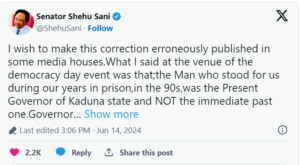Senator Shehu Sani has recently provided important clarifications regarding the role of the Kaduna state governors in the pro-democracy struggles associated with June 12. In his statements, Sani clarified that his comments were not aimed at Mallam Nasir El-Rufai, the immediate past governor of Kaduna state, but rather at the current governor, Senator Uba Sani.
The former federal lawmaker emphasized that El-Rufai was not involved in the June 12 pro-democracy struggle. Instead, he highlighted the significant contributions of the current Kaduna governor, Senator Uba Sani. According to Shehu Sani, El-Rufai was not known for any involvement in the events surrounding the June 12 struggle, which were critical in Nigeria’s democratic history.
Shehu Sani, who represented Kaduna Central in the Senate, made these remarks during a dinner hosted in honor of the pro-democracy activists who were part of the June 12 struggle. He mentioned that while El-Rufai supported him and others during their imprisonment, it was Senator Uba Sani who played a crucial role during those tumultuous times.
At the dinner event, Sani stated that he was specifically referring to Senator Uba Sani when discussing the support and efforts during the pro-democracy struggle. He praised Uba for maintaining contact between those imprisoned and their families, an essential lifeline during those dark days. This role, he noted, was vital in keeping the morale and spirit of the struggle alive.
Senator Shehu Sani further elaborated on these points through his X handle (formerly known as Twitter) @ShehuSani on Friday, June 14. He acknowledged Governor Uba’s relentless efforts to stay connected with the pro-democracy and progressive forces despite facing significant risks. Sani recounted how Uba Sani continued his advocacy even after being detained by the Department of State Services (DSS) and how he endured re-arrest and police brutality.
In his post, Sani underscored that Uba Sani’s commitment did not waver, even in the face of severe personal danger. He noted that Uba’s actions were instrumental in bringing the struggle to Northern Nigeria, ensuring that the movement had a broad base of support. This dedication was vital in sustaining the momentum of the pro-democracy movement during a period of intense repression.
Shehu Sani’s clarification is significant in setting the historical record straight regarding the contributions of different individuals to Nigeria’s democratic journey. By distinguishing between the roles of Nasir El-Rufai and Uba Sani, Sani aims to ensure that the correct narrative is preserved, recognizing those who were genuinely involved in the struggle.
The June 12 struggle is a pivotal chapter in Nigeria’s history, representing the fight against military rule and the quest for democratic governance. The movement was marked by significant sacrifices, with many activists facing imprisonment, torture, and even death. Recognizing the correct contributors to this movement is crucial for preserving the integrity of Nigeria’s democratic history.
Senator Uba Sani, now the governor of Kaduna state, is acknowledged for his bravery and steadfastness during this period. His efforts, as described by Shehu Sani, played a key role in connecting imprisoned activists with their families and keeping the pro-democracy cause alive. These actions are an essential part of the historical narrative that highlights the personal sacrifices made for Nigeria’s democracy.
In contrast, Nasir El-Rufai, despite his later political prominence, did not have a notable presence in the June 12 struggle. This distinction is important for understanding the different contributions and roles played by various individuals in Nigeria’s political history.
Senator Shehu Sani’s remarks and subsequent clarification help illuminate the true heroes of Nigeria’s pro-democracy struggle, ensuring that their contributions are rightfully acknowledged and remembered. This effort to set the record straight is essential for honoring those who risked everything for the cause of democracy and for educating future generations about the true history of their nation’s fight for freedom and justice.






